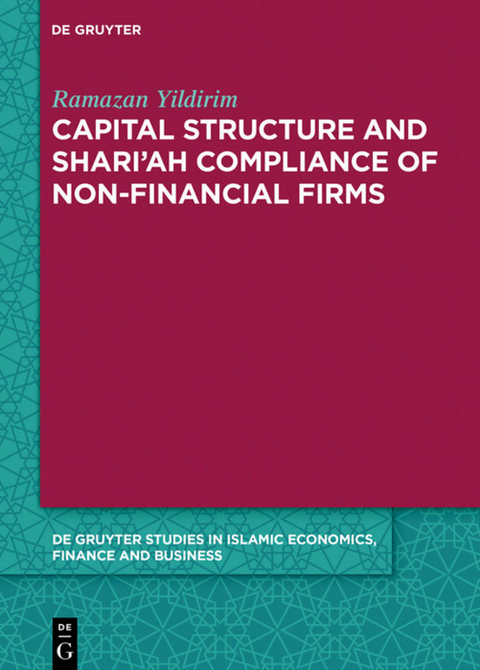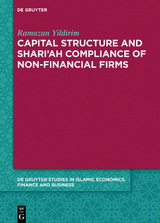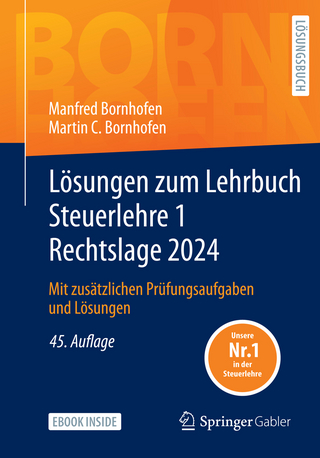Capital Structure and Shari’ah Compliance of non-Financial Firms
lt;p>Ramazan Yildirim, Managing Director of Upsite Consulting, Kingdom of Bahrain
Table of Contents
Chapter 1: Introduction
Chapter 1.1 Context and Background
Chapter 1.2 Motivation and Objectives
Chapter 1.3 Organization of the Book
Chapter 2: Capital Structure Theories and its Determinants
Chapter 2.1 Introduction
Chapter 2.2 Definition of Capital Structure
Chapter 2.3 Development of Capital Structure Theories
Chapter 2.4 The Trade-Off Theory
Chapter 2.5 The Pecking Order Theory
Chapter 2.6 Capital Structure Determinants
Chapter 2.7 Review of Earlier Capital Structure Studies on Shari'ah Compliant Companies
Chapter 2.8 Conclusion
Chapter 3: Shari'ah Compliant Equities and Capital Structure
Chapter 3.1 Historical Background
Chapter 3.2 Shari'ah Screening Methodology
Chapter 3.3 Critical Comments on Shari'ah Screening Methodology
Chapter 3.4 Proposed Solution for Shari'ah Screening Methodology
Chapter 3.5 Proposed Expected Financing Hierarchy
Chapter 3.4 Conclusion
Chapter 4: Establishing a framework for comparative analysis
Chapter 4.1 Data Selection Procedure/Data Sources and Classification of Datasets
Chapter 4.2 Estimator and Post Estimation Tests
Chapter 4.3 Formulation of Variables
Chapter 4.4 Model Specification and Testing Model
Chapter 4.5 Conclusion
Chapter 5: Cross-Country and Cross-Industry Determinants
Chapter 5.1 Descriptive Summary and Correlation Matrix Analysis
Chapter 5.2 Empirical Results and Analysis
Chapter 5.3 Conclusion
Chapter 6: Testing of Capital Structure Theories
Chapter 6.1 Pecking Order Model
Chapter 6.2 Partial Adjustment Model (Speed of Adjustment)
Chapter 6.3 Conclusion
Chapter 7 Conclusion
Chapter 7.1 Overview and Key Findings
Chapter 7.2 Implications of the Study
Chapter 7.3 Contribution of the Study
Chapter 7.4 Limitations of the Study
Chapter 7.5 Suggestions for Future Research
| Erscheinungsdatum | 24.03.2021 |
|---|---|
| Reihe/Serie | De Gruyter Studies in Islamic Economics, Finance and Business ; 9 |
| Zusatzinfo | 40 b/w ill., 106 b/w tbl. |
| Verlagsort | Berlin/Boston |
| Sprache | englisch |
| Maße | 170 x 240 mm |
| Gewicht | 798 g |
| Themenwelt | Wirtschaft ► Betriebswirtschaft / Management ► Finanzierung |
| Schlagworte | Banks, Financial Service Provider, Insurers • Betriebswirtschaft • Business & Economics • Business and Economy • capital structure • Capital Structure, Corporate Finance, Islamic Finance, Islamic Capital Markets, Shari'ah Screening • Capital Structure, Corporate Finance, Islamic Finance, Islamic Capital Markets, Shari’ah Screening • Corporate Finance • Finance • History • insurance • Islamic Banking & Finance • Islamic capital markets • Islamic Finance • Middle East • Shari'ah Screening • Shari’ah Screening |
| ISBN-10 | 3-11-071350-0 / 3110713500 |
| ISBN-13 | 978-3-11-071350-3 / 9783110713503 |
| Zustand | Neuware |
| Haben Sie eine Frage zum Produkt? |
aus dem Bereich




